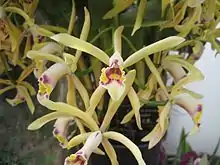Cattleya iricolor
Cattleya iricolor is a species of orchid native to the eastern montane forests of Ecuador and Peru.
| Cattleya iricolor | |
|---|---|
 | |
| Scientific classification | |
| Kingdom: | Plantae |
| Clade: | Tracheophytes |
| Clade: | Angiosperms |
| Clade: | Monocots |
| Order: | Asparagales |
| Family: | Orchidaceae |
| Subfamily: | Epidendroideae |
| Genus: | Cattleya |
| Subgenus: | Cattleya subg. Cattleya |
| Section: | Cattleya sect. Cattleya |
| Species: | C. iricolor |
| Binomial name | |
| Cattleya iricolor | |
Description
Cattleya iricolor is an epiphytic orchid with slightly compressed pseudobulbs with a single terminal leaf each. The leaves are narrow, up to 35 cm long and 3 cm wide. Flowers are very fragrant, creamy white or yellowish, 8 cm across in size, with long and narrow petals and sepals, pointy lip; up to 6 flowers per pseudobulb.[1][2]
Distribution and habitat
Cattleya iricolor grows in Peru and Ecuador in montane forests of the eastern Andes at elevations of ca.1000 m.[1][3]
Conservation
The conservation status of Cattleya iricolor is assessed as vulnerable since 1997 by the IUCN.[3]
References
- Withner, C. (1988). The Cattleyas and Their Relatives. Volume 1: The Cattleyas. Timber Press. pp. 29–30. ISBN 978-0-88192-099-4.
- "Cattleya iricolor – Cattleya Source". cattleya.wikidot.com. Retrieved 2017-05-10.
- Walter, Kerry S.; Gillett, Harriet J. (1998). 1997 IUCN Red List of Threatened Plants. IUCN. ISBN 9782831703282.
This article is issued from Wikipedia. The text is licensed under Creative Commons - Attribution - Sharealike. Additional terms may apply for the media files.
